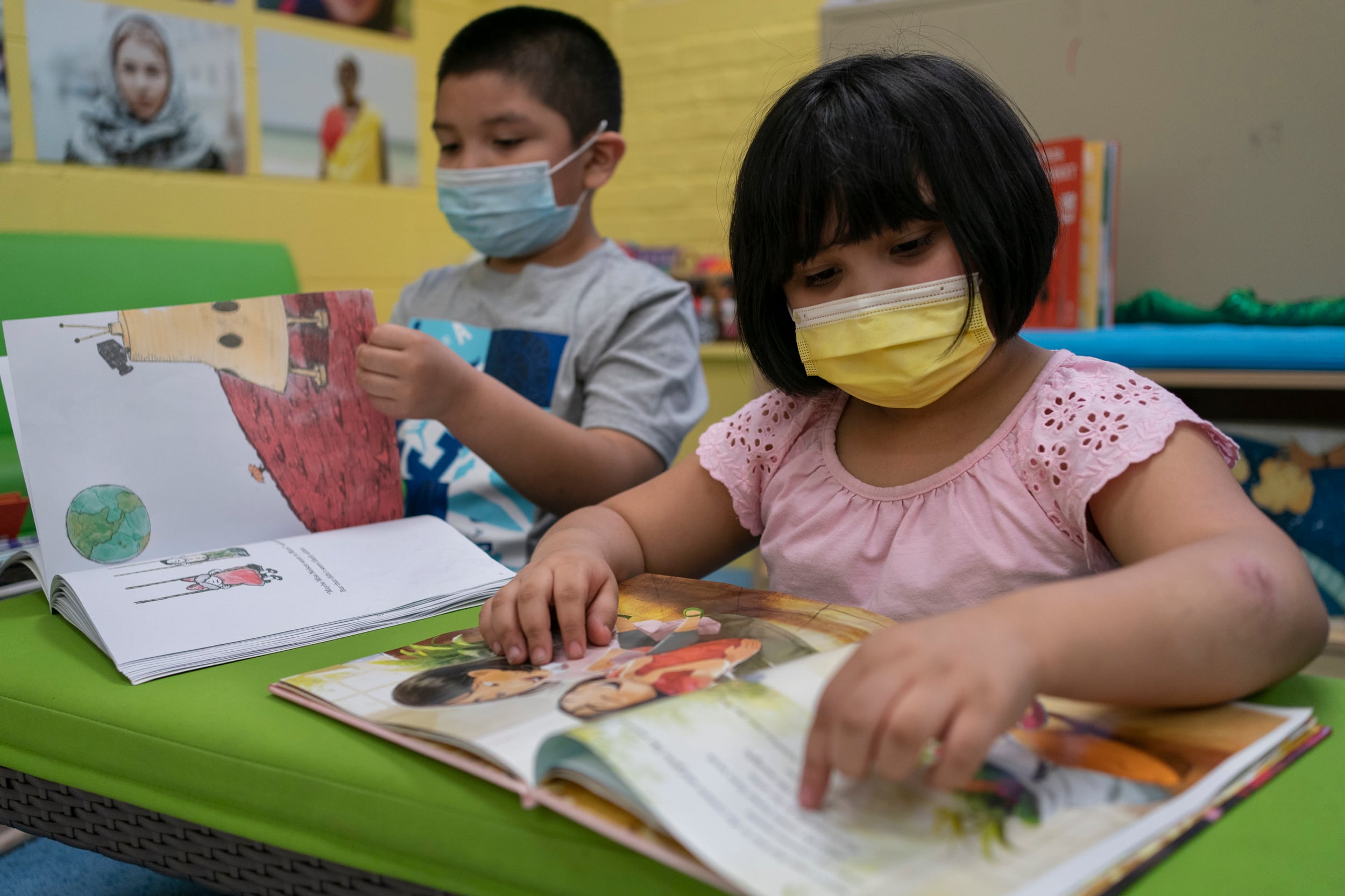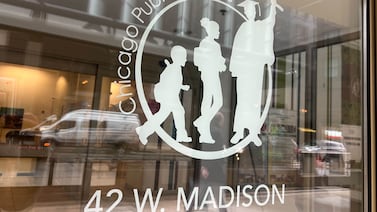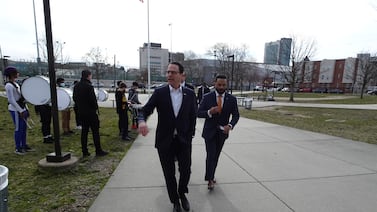Leer en español.
There is mounting urgency over getting more Colorado students reading on grade level, yet parents often can’t find information on what makes great literacy instruction and what practices their schools follow.
Interested in learning more? During a panel discussion hosted by Chalkbeat Colorado and the Montbello Power Advocates, parents, teachers, and experts will weigh in on how schools can better teach students how to read. The Nov. 11 conversation follows Chalkbeat Colorado investigations over the last year that reveal a huge variety of reading curriculums in use, often different programs at schools a few miles apart. Leaders in one metro Denver district said they didn’t know what schools were using to teach reading because they had never compiled such a list until Chalkbeat requested it.
Read on for the Chalkbeat resource guide for event attendees and anyone who wants to better understand how reading is being taught in Denver Public Schools generally and in the northeast neighborhood of Montbello specifically.
Montbello has 11 elementary or K-8 schools and only two of them, both charter schools, use state-approved reading curriculums in kindergarten through third grade. The challenges for young readers in Montbello mirror a statewide issue. Before the pandemic, six in 10 third graders across Colorado couldn’t read proficiently, and those issues have been exacerbated over the last year. At one Colorado school, the pandemic torpedoed many of recent literacy gains and threw an especially disruptive wrench into students’ educations.
You can watch the full conversation at the bottom of this article.
How do I search for my school’s literacy curriculum? What is structured literacy, anyway?
You can use our search tool at the bottom of this 2020 Chalkbeat Colorado article to find your Denver school’s curriculum and whether or not it’s state approved.
How can I ask questions about literacy at my school?
These documents will walk you through the questions you should ask about how schools approach literacy instruction in the early grades, including what to look for and potential red flags. The tools were created by COKID, an advocacy group for children with dyslexia, and a school improvement consulting firm called Schools Cubed.
- Colorado Literacy Dialogue Tool (link)
- Spanish Colorado Literacy Dialogue Tool, translated into Spanish (link)
The Colorado Department of Education offers two FAQs about dyslexia:
What articles should I read on literacy in Denver and Colorado schools?
- “Colorado adopts more rigorous reading test for prospective teachers”(link) June 9, 2021
- “Dyslexia screening: Colorado efforts aim to identify students early” (link) March 15, 2021
- “Denver says this reading curriculum supports English learners. But the state says it’s not based on science and has to go” (link) Dec. 14, 2020
- “Colorado’s emphasis on phonics in reading could hurt English language learners, advocates say” (link) Dec. 15, 2020
Who are the panelists at Chalkbeat’s Nov. 11 event, and what resources do they suggest for parents, educators, and students?
The panel will feature:
- Ann Schimke, Chalkbeat reporter and moderator
- Sonia Cabell, associate professor at the Florida Center for Reading Research at Florida State University
- Kelly Okoye, longtime Montbello educator and school co-founder
- Priscila Ramirez, Montbello parent and community activist
- Holly Baker Hill, dyslexia and literacy specialist at Denver Public Schools
- Meredith Stolte, director of humanities at Denver Public Schools
Our panelists recommended the following resources:
- The Florida Center for Reading Research research database for parents and educators (link).
- A primer on structured literacy from the International Dyslexia Association (link).
- Tools for accessing dyslexia resources, finding providers near you, and tracking dyslexia legislation in your state from the International Dyslexia Association (link).
- Fact sheets from the International Dyslexia Association, available in English and Spanish (link).
- The Colorado Department of Education list of approved K-3 reading programs (link).
- Resources for families on navigating ADHD and dyslexia from Understood, available in English and Spanish (link).
Watch our conversation in full:
Note: To view the comments of Spanish-speaking panelists in English, read below.
Spanish-to-English captions:
Minute 6-7:23
Blanca Madrid: Hello, good afternoon, my name is Blanca Madrid. I am co-founder of an early childhood program called the Piñata of Learning, in this program, we serve families who have children ages 0-5 years old around the Denver metro area, including Montbello. I have lived here in Montbello for over 10 years. I am passionate about community work. I believe that creating solutions to the needs of our neighborhood is very important. It’s very important, that’s why I’m here proudly on the NPA team. And who are we? Well, we are immigrants or we are children of immigrants with a large part of... a large part of the United States. We are many cultures together, a diverse and resilient community. We are extremely local, but we are also very international. We are simple dreamers who come to build a future for our families, we are parents, students, teachers, and organizers. We are a group that fights racism, violence, ignorance, gangs, and most of all, we are a group that promotes equity. I would love to introduce each one of my colleagues and have them introduce themselves individually, thank you Dede, and especially one of our panelists who is here today, Priscila Ramirez. Thank you.
Minute 9-13:21
Priscila Ramirez: Hi, good evening Ann, good evening everyone and thank you for being here with us tonight. Specifically, on my son’s education...it’s been a very difficult road to deal with so far. Because since we started, we started identifying that he had a communication problem, he didn’t speak what other kids his age were speaking. He didn’t have that flow of language. So this led us down a totally unknown path because there was no one to guide us to know what special education was. One of the things that has worked well is that, thanks to the system from the beginning of his school years, he began to have speech therapy intervention. Unfortunately, after many years and different schools we saw that he wasn’t learning, he wasn’t learning because the learning system or the curriculum that is followed in most schools is not functional for children with dyslexia. We found that last year he was diagnosed with dyslexia because, after years and years of struggling with the fact that he wasn’t learning, that he was behind, that he wasn’t at grade level, that he wasn’t reading at grade level; I decided to start doing more research and look at what options my son had, not just what the school was offering me. Through that, we got him evaluated by Children’s Hospital and that’s where we found out that he has dyslexia. Obviously, the curriculum that is taught in regular schools, which is based on balanced literacy education doesn’t work for a dyslexic brain. So, what we’ve done since then is we’ve been able to get a person, a therapist to come in and do therapies at home and he has the support of the school as far as speech therapy. So far it’s worked, but unfortunately in the Denver Public Schools and in the charter schools... we don’t have specific therapy or we don’t have the equity that every child needs to be educated. Equality is practiced for everyone and they are served, but they don’t equitably receive the services that they really need. So, as a parent, it’s been one of the biggest concerns for me because I know that my child is not the only one that has special needs and they’re not being met by the school. I think functionally we’ve learned a lot and through the experience, we’ve been able to guide other parents. But unfortunately, I know that he’s already at a grade level that the next grade level he’s going to have to read to learn and he’s still at a disadvantage that he’s not reading at grade level yet. And it’s concerning to me as a parent because I know that under statistics most prison systems are based on the reading levels that second and third graders have. So, thinking ahead, I want to see my son fulfilled and practicing what he likes to do with a good education. I don’t want to visualize my son getting into trouble in the prison system just because he didn’t have the support to learn to read.
Minute 27:59-29:50
My only advice would be: You know your children better than anyone else. Culturally we are used to teachers or professors having more knowledge than we do academically. But, as their parents, we know them and we know more about them than anyone. If we have any doubt that something is not right with our kids and then we go to school, they will usually tell you that everything is fine, he’s going to catch up, everything is going to get better; I say that’s a bad sign. Because if a child is already behind, it’s going to be very difficult for him next year to catch up. So my only advice is: Look for yourselves. Search for yourselves, try to search for all the resources that are available. If the language barrier makes it difficult for you, look for someone for help, whether it’s the school, a teacher, a neighbor, someone who does community work. Because unfortunately in the district, we don’t have advocates who can help. Sadly, I think it’s one of the districts that doesn’t have people who are dedicated to advocating for the special needs of children. So, if there is no one to do it, let’s do it ourselves. As parents let’s be the best advocates for our children, let’s not let someone else come in and do our job.
Minute 51:35-54:09
I don’t think anything has been done. Unfortunately, with the pandemic, it just exacerbated the problems that already existed. Personally, with parents who were close to me, I was able to give them some direction as to where or what they could do. But the children that don’t have the opportunity or don’t have the facility to... not for lack of interest, but maybe because their parents don’t know how to do it, they don’t have any possibility. I don’t know, they don’t have any help. They keep going and going from year to year, having the same problem and it gets even worse each time. Unfortunately, this is one of the situations that Montbello is going through. As I said before, we don’t have a regularized advocacy system to help the child that may or may not have a family member to advocate for them, and there is definitely someone to advocate for them. But maybe it’s not because the family doesn’t want to, it’s because they don’t know how to do it. Because it’s a very difficult path for all families. There is no guide to identify from the moment you start to realize that there are problems in the linguistic development of your child. There is no guidance that tells you after such-and-such a step and such-and-such a step follows such-and-such a step. There’s no guidance from the district, there’s no guidance from the teachers, you’re thrown into the ring. So sadly, it was one of the things that we realized is happening here in Montbello that was more acute with the pandemic. And it’s something that we want to recognize so that, by recognizing it, change can be made. We can no longer go through the blindfold of saying, “It’s not happening because we don’t know”. Now we know it exists. Now, whether or not the child has family representation, I think it would be very important so that the child can be given the help that is needed.







